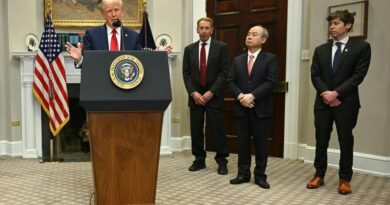Standing with Elon: Time to Curb DC’s Excessive Spending and Unreasonable Regulations

The Department of Government Efficiency has initiated actions.
The media in DC are outraged by his efforts to reduce the size of government agencies.
However, I stand with Elon Musk.
Time and again, promises of a more efficient government have been made, yet none have come to fruition.
Instead, we’ve only seen government expansion.
Sen. Rand Paul highlights absurd government “investments,” such as the $118,000 study on finger snapping, described by the National Science Foundation as being “inspired by the infamous finger snap of the comic book villain ‘Thanos.’”
The conclusion? “Varying degrees of friction between the fingers alter . . . performance of a snap.”
Thanks for the insight.
Countless dollars were also spent to determine whether Neil Armstrong, during the moon landing, said: “One small step for man,” or “one small step for a man.”
NASA asserts that no “a” can be heard in the recordings, and I’ve never detected an “a,” but we collectively funded a study where the Science Foundation concluded, “Ambiguity exists.”
Thanks for nothing.
Additionally, $1.5 million was allocated to discover how to enhance tomato flavor, with researchers finding that sugar does the trick.
As America grapples with financial issues, it is absurd for wealthy individuals to finance such trivial research. Taxpayers shouldn’t bear the burden.
Nevertheless, each special interest group will fight for their survival, and even if Musk successfully eliminates such funding, it would scarcely make a dent in our soaring deficit.
Let’s consider larger reductions:
Chris Edwards, editor of the Cato Institute’s “Downsizing Government” website, states, “The first area I would target for cuts is the over trillion-dollar subsidies allocated to state and local governments — K-12 education funding, school meal funding, food stamp funding.”
Providing food stamps may seem compassionate, but Edwards points out that “Taxpayers fund candy and cake,” and when “states propose limits on junk food, they’re met with restrictions.”
Indeed. States are prevented from curbing welfare payments concerning junk food.
Edwards also recommends cuts to corporate welfare: “The federal government spends $180 billion annually subsidizing corporations, but this doesn’t benefit the average citizen.”
Additional savings could be realized by liquidating the government’s vast inventory of “an astonishing 300,000 buildings.”
Many of these properties remain vacant and in pristine condition, yet the government refuses to sell.
Additionally, bureaucrats are reluctant to divest unused land. The federal government owns significant tracts, including most of the land in the American West.
“The market value is uncertain,” says Edwards. “It could be worth trillions.”
Rather than selling, politicians opt to print more money, leading to more land acquisitions, such as Biden’s recent purchase of 640 acres in Wyoming.
President Trump has indicated he’ll implement cuts. Will he follow through this time? In the past, he did not.
However, he seems more committed now.
He has recently initiated the termination of DEI programs, instructing federal DEI employees, “Stay home.”
Yet, he continues to pay them!
“Firing federal employees is incredibly challenging,” Edwards highlights.
Moreover, even if Trump managed to terminate every federal employee, it wouldn’t erase the deficit.
Addressing the deficit is almost impossible without targeting the largest expenditures — defense, Medicare, Social Security.
So far, Trump has expressed no intention to address these areas.
“Trump doesn’t have to resolve the entire deficit issue during his four-year term,” says Edwards, “but he needs to initiate progress.”
Government doesn’t necessarily need to balance its budget.
If it merely reduced the growth of spending, the private sector might expand sufficiently to lessen our debt burden.
Yet, how can the private sector thrive amidst so many regulations?
“SpaceX was required to conduct a study to determine if Starship would collide with a shark,” Musk remarks. He conveys that he told regulators, “It’s a vast ocean; there are many sharks. While it’s not impossible, it’s highly unlikely.”
After regulators finally dropped their concerns about sharks, Musk believed SpaceX’s launch was sanctioned.
“We thought, ‘Great, we’re finished.’ Then they asked, ‘What about whales? . . . If the rocket goes underwater and then explodes, will the whales incur hearing damage?’ This is real! The absurdity continues.”
Perhaps Musk will alter this scenario. One can hope.
To remedy our staggering deficits, we must achieve growth.
To enable that, we require reduced government expenditure and diminished regulations.
John Stossel is the author of “Give Me a Break: How I Exposed Hucksters, Cheats, and Scam Artists and Became the Scourge of the Liberal Media.”



